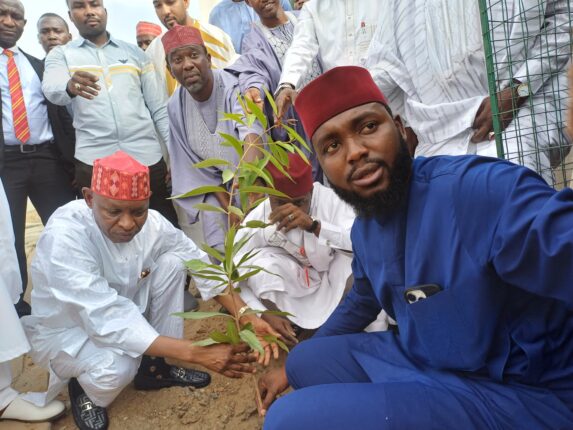The Kano State government, through its Agro-Climatic Resilience in Semi-Arid Landscape (ACReSAL) project, says it has completed the planting of two million trees to combat the impact of climate change.
Grassroots Parrot reports that the ACReSAL project is also working on modalities to introduce climate change clubs at secondary schools to instill the culture of climate change resilience on students.
Kano ACReSAL’s Project Coordinator, Dr Dahir Muhammed Hashim, disclosed this on Monday when he briefed newsmen in Kano.
Dr Hashim spoke on the achievements of the project in the last three months of its tree planting campaigns and other interventions in the state.
“As many of you will recall, on June 26, 2024, we heard a press conference to introduce a bold step that the Kano state government will take to combat the impact of climate change.
READ ALSO: Gov Yusuf Harps On Climate-Smart Actions Implementation, Hails SAA For Kano Agricultural Growth
“One of the key initiatives launched was the three million tree planting, which we name (3MTP), aims to plant three million trees across the rural and urban areas of Kano State to safeguard our environment.
“Within just three months of launching these initiatives, we have completed the planting of two million trees across the rural areas.” He said.
According to him, “the rehabilitation of four kilometers by 24 belts of shelterbelt in Yan Bawa in Makoda Local Government Area and fur belts of 2.5 kilometers in Ginzo in the Bagwai Local Government Area were parts of the achievements within the period under review,”
“Notably, we have rehabilitated 106 kilometers of shelterbelt, an essential barrier that protects our soil from desertification, wind erosion, and excessive sunlight.
READ ALSO: Climate Change: Kano Govt Sets To Plant 3m Trees
“We also rehabilitated four kilometers of shelterbelt in Makoda LGA and four belts of 2.5 km in Sabongari Getso, Bagwai LGA.”
He said they established woodlot plantations in Dunawa and Sabon Ruwa in Makoda LGA to provide sustainable firewood sources for local communities as part of efforts to curtail indiscriminate cutting down of trees.
“We have engaged in forest conservation and enrichment planting of indigenous species in areas such as Daddarawa, Dajin Kura in Tsanyawa LGA, Dan Soshiya, Kyarana in Kiru LGA, and Gwarmai in Ghari LGA (formerly Kunchi LGA),” he noted.
The project coordinator explained that ACReSAL also developed a 100-hectare conventional orchard in Kyale at Gabasawa LGA and established individual orchards for over 1,200 farmers in various local government areas.
He said “Our efforts to regenerate indigenous species have yielded the recovery of 41,087 trees, with over 59,900 beneficiaries positively impacted so far—a number we expect to grow once the final enumeration is completed.”.
READ ALSO: Nasarawa Communities Combat Climate Change Through AACJ Project Interventions
He added that the project also restored 21,261 hectares of degraded land through afforestation efforts in its determination to combat climate change and restore Kano’s landscape.
“In the urban phase of the initiative, the project rehabilitated two nurseries—one in Kafin Ciri, Garko LGA, and another in Mai Nika Gwarzo LGA—with a combined capacity to produce one million seedlings.
According to the project coordinator, both nurseries are now fully operational, equipped with solar-powered boreholes, offices, and other necessary infrastructure.
Meanwhile, in its ‘catch them young’ campaign to boost climate change resilience in the state, Dr. Bashir said the state government is planning to establish climate change clubs in at least one hundred secondary schools.
READ ALSO: Food Security: BUK, AfDB Partner On Climate Adaption, Entrepreneurship
Dr Hashim assured that the club would soon be inaugurated to expose the secondary school students to the mechanism gearing towards enhancing environmental resilience in the state.
He also appreciated the unrelenting commitments of the state governor, Abba Kabir Yusuf towards addressing environmental issues in the state.
